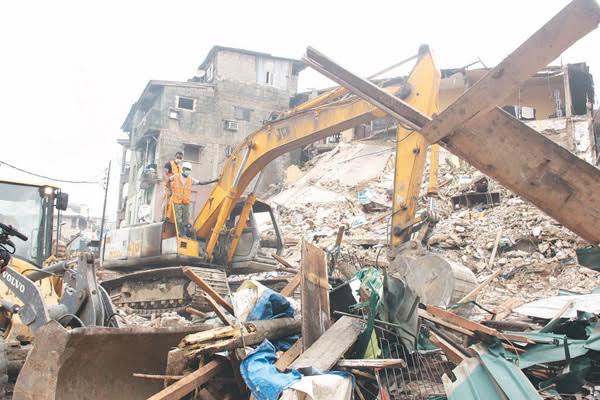In view of the incessant building collapse in the country, an expert has cautioned Nigerians to avoid human activities that have adverse effect on environment and structures.
Mr Luka Achi, former National President, Nigerian Institute of Town Planners (NITP), gave the advice on Tuesday in an interview in Abuja.
A three-storey building located in Ita-Faji area of Lagos Island had on March 13 collapsed, killing many of its occupants being primary school children, while many were injured.
On March 15, another two-storey building collapsed along Bode area of Ibadan, Oyo State.
The town planner said that some activities such as indiscriminate mining, drilling of bore holes and excavation, among others could have adverse effects on the subsoil and cause building collapse.
“There are times we take for granted the effect of environmental pollution substances and acidic materials like batteries, metals, even waste products and bury them carelessly.
“When we bury these acidic and waste products around a structure, they have adverse effects on the buildings. There are some trees when being planted around buildings, they tend to cause problem or blockage of the drain.
“There are some structures, no matter how strong they are but because the soil is porous, once trees are planted very close, their roots tend to find way through a crack into the building to cause serious damage,’’ Achi said.
He warned that for building collapse to be curbed, Nigerians must stop engaging in indiscriminate activities around buildings and environment and increase sensitisation on such.
According to him, allowing water to accumulate for a long time in a place without being drained and indiscriminate drilling of bore hole without proper supervision should be stopped.
“People who want to drill borehole are advised to consult the water board or appropriate authority before drilling to avoid problem,’’ he said.
He also called on housing developers to abstain from substandard materials, engage professionals and rely on integrity test to enhance building lifespan.
Achi, a former Director, FCT Parks and Recreation, explained that a building has a life span just like a living thing and should be checked or examined at intervals to avoid waste of resources.
“Developers should do the right thing in housing construction to enhance safety and should not wait to check the validity of a structure. Rather, they should meet the right authority to do so.
“Regulators should have a programme of cross checking validity of buildings at intervals for integrity test and always issue a certificate to proof. They should ensure that the right thing is done.
“If you do an integrity test and it fails, you should not blame the developer, rather you should oblige to advice if you are interested in sanctity of life, safety of life and property,’’ he advised.
He said that integrity test was necessary and could be used to ascertain the validity of building constructed several years ago with a questionable technology.
“That is why an integrity test should be done every now and then depending on the structure so that once there is stress in the building, it will be brought down to avoid collapse but usually we hardly do it,’’ Achi said.
According to him, the Development Control Unit in every state including the FCT has the right to ensure that integrity test is carried out on buildings and issuance of certificate approval of existence.
He further said that the weight that a structure could carry should also be taken into consideration during construction to avoid collapse.
“In some constructions, the weight could be much that they added to the problem of the building and sometime the way the design had been implemented might not follow the guidelines of the construction.
“A structural engineer has a lot to do in this aspect by guiding in the building production,’’ he said.
Achi advised that the carrying capacity of any structure should be put into consideration to maintain its lifespan and avert danger.

 Health6 days ago
Health6 days ago
 Entertainment1 week ago
Entertainment1 week ago
 Crime6 days ago
Crime6 days ago
 Education1 week ago
Education1 week ago
 Health1 week ago
Health1 week ago
 Comments and Issues7 days ago
Comments and Issues7 days ago
 Football1 week ago
Football1 week ago
 Latest7 days ago
Latest7 days ago

